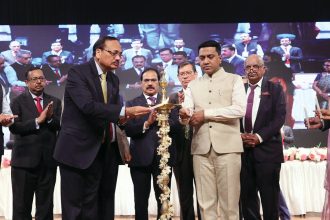Samrudhdi Kerkar
The Dhalo festival, celebrated in the tenth month of the lunar calendar, Paush, is a special occasion for women in Goa, filled with song, dance, and reverence for nature. Although the festival now lasts five days instead of eleven, its significance remains unchanged. During the celebration, women sing folk songs that honour Mother Earth, the forest goddess, and the springs that nourish their fields.
Winter marks the time for Dhalo, a season of slowing down and expressing gratitude for nature’s gifts. Through Dhalo’s folk songs, women honour Dhartari (Earth), Gayatri (Cow), and Van Devi (Forest Goddess), all connected to nature. The festival begins when winter is in full swing, with trees blooming and the air filled with peace.
The songs vividly describe the beauty of the season—mango trees in bloom, golden Amramanjiri flowers swaying in the breeze, and the scent of Parijat flowers filling the air. The women also act out scenes from nature, such as a mother hen protecting her chicks from a kite, bringing real-life moments to life through expressive performances.
Dhalo also signifies the harvest season, giving women a chance to rest after a year of hard work. The festivities begin when winter is in full swing, and women join in the joyful nights of song and dance.
Although my grandmother never went to school, she was rich in traditional knowledge passed down through community customs. She loved taking me to Dhalo, where I joined in the dances and songs. My parents, also passionate about folk culture, often researched the history and meaning of Dhalo, and I joined them to learn more.
The celebration takes place at a ‘Maand’, a traditional gathering place with a Tulsi pedestal at the center. Women, adorned in colourful kapads and Shevanti flowers in their hair, gather under the midnight sky, linking arms and dancing in unison, forgetting their worries for a while.
The festival begins with a melodic chant, “Kartik mahina, Kartik mahina, Malani punve aanand zala ge,” and through the songs, women pass down traditions and stories. The Tulsi Vrundavan, with its sacred Basil plant, stands at the heart of the celebration, regarded as a trusted companion by women in agriculture.
The folk songs sung during Dhalo have been passed down through generations, with no one knowing who first composed them. These songs capture meaningful moments and continue to evolve, with new verses added over time. While some traditions might seem outdated, folk artists work hard to preserve them.
Dhalo is not just a festival but a chance for Goan women to showcase their talents in music, dance, and drama, preserving their traditions for future generations.




